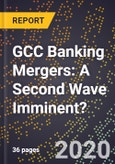The GCC banking sector, which has been dormant in terms of major M&A activity over the past two decades, has seen a sudden surge in M&A related announcements since 2017. Another wave of banking mergers in the GCC is likely to be triggered in 2020 as the coronavirus crisis has severely altered the global economic landscape. The dual challenge of low oil prices and the slowdown in economic activity will hit the profitability of GCC banks due to shrinking net interest margins and deteriorating asset quality.
Although mergers theoretically provide several benefits to the merging banks, the banking industry and the economy, history suggests that not all mergers end up being successful from the shareholder perspective. Analysing some of the major GCC banking mergers in the past throws light in this regard and provides valuable insights on what to expect from upcoming mergers.
Key Highlights
- Another wave of banking mergers in the GCC is likely to be triggered as the COVID-19 crisis has severely altered the global economic landscape. The dual challenge of low oil prices and the slowdown in economic activity will hit the profitability of GCC banks due to shrinking net interest margins and deteriorating asset quality.
- Although mergers theoretically provide several benefits to the merging banks, the banking industry and the economy, history suggests that not all mergers end up being successful from the shareholder perspective.
- Analysing some of the major GCC banking mergers in the past provides valuable insights on what to expect from upcoming mergers.
Key Questions
- Do mergers in the GCC banking sector create value for their shareholders?
- Will COVID-19 trigger a second merger wave in the GCC banking industry?
- What were the key mergers in the GCC region in the past two decades? Did they succeed?
Why purchase the report?
- The report analyses whether previous banking mergers in the GCC have created value for the shareholders.
- The report will benefit anyone who seeks to study the impact of mergers on the performance of GCC banks.
- Considering the expectations of further consolidation in the GCC banking industry post-COVID-19, the report provides insights on how key mergers in the past have fared.
- It would also provide direction on what to expect from the upcoming mergers.
- The report extensively covers the mergers of Emirates NBD, Al Salam Bank, First Abu Dhabi Bank and National Commercial Bank + Samba.
Table of Contents
1 Overview
2 Why do banks opt for mergers and acquisitions?
3 GCC Banking Merger Wave
4 Case Studies
4.1 Emirates NBD (Emirates Bank Intl. & National Bank of Dubai)
4.2 Al Salam Bank (Al Salam Bank & BMI Bank)
4.3 First Abu Dhabi Bank (National Bank of Abu Dhabi & First Gulf Bank)
4.4 NCB and Samba (National Commercial Bank and Samba Financial Group)
5 Conclusion
6 Appendix
Companies Mentioned
- Abu Dhabi Commercial Bank
- Abu Dhabi Islamic Bank
- Ahli United Bank
- Ahli United Bank
- Al Hilal Bank
- Al Khaliji Commercial Bank
- Al Salam Bank Bahrain
- Alizz Islamic Bank
- Bahrain Islamic Bank
- Bank Dhofar Al Omani Al Fransi
- Bank Muscat Al Ahli Al Omani
- Bank Muscat Al Ahli Al Omani
- Barwa Bank
- Barwa Bank
- Dubai Islamic Bank
- Emirates Bank Intl
- Emirates NBD Bank
- First Gulf Bank
- HSBC Bank Middle East Ltd
- Ithmaar Bank BSC
- National Bank of Abu Dhabi
- National Bank of Bahrain
- Noor Bank
- Oman Arab Bank
- Oman International Bank
- Samba Financial Group
- Saudi American Bank
- Saudi Investment Bank
- Union National Bank
- United Saudi Bank








